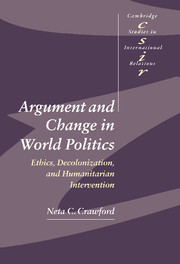Book contents
- Frontmatter
- Contents
- List of illustrations
- List of tables
- Acknowledgments
- Introduction
- 1 Argument, belief, and culture
- 2 Ethical argument and argument analysis
- 3 Colonial arguments
- 4 Decolonizing bodies: ending slavery and denormalizing forced labor
- 5 Faces of humanitarianism, rivers of blood
- 6 Sacred trust
- 7 Self-determination
- 8 Alternative explanations, counterfactuals, and causation
- 9 Poiesis and praxis: toward ethical world politics
- Appendix. African decolonization
- Select Bibliography
- Index
- CAMBRIDGE STUDIES IN INTERNATIONAL RELATIONS
8 - Alternative explanations, counterfactuals, and causation
Published online by Cambridge University Press: 22 September 2009
- Frontmatter
- Contents
- List of illustrations
- List of tables
- Acknowledgments
- Introduction
- 1 Argument, belief, and culture
- 2 Ethical argument and argument analysis
- 3 Colonial arguments
- 4 Decolonizing bodies: ending slavery and denormalizing forced labor
- 5 Faces of humanitarianism, rivers of blood
- 6 Sacred trust
- 7 Self-determination
- 8 Alternative explanations, counterfactuals, and causation
- 9 Poiesis and praxis: toward ethical world politics
- Appendix. African decolonization
- Select Bibliography
- Index
- CAMBRIDGE STUDIES IN INTERNATIONAL RELATIONS
Summary
I am very busy here going through the Indies archives and calculating the profit which Spain made then and makes now out of her colonies.
I know enough tribes in Africa. They all have the same mentality insofar as they yield only to force. It was and remains my policy to apply this force by unmitigated terrorism and even cruelty. I shall destroy the rebellious tribes by shedding rivers of blood and money.
One of the problems in writing about decolonization is that we know the end of the story. Whether self-government is seen as the outcome of a process of preparation carried out by a colonial state or as a triumph wrested from the colonizers by national movements, the story lends itself to be read backwards and to privilege the process of ending colonial rule over anything else that was happening in those years.
The content of argument, belief, and culture enables, shapes, and limits, providing a discursive structure to world politics that is as real as the military forces of states or the balance of power among them. Previous chapters highlight the use of ethical arguments by agents to bolster or undermine colonial practices and institutions, but scientific, identity, and practical arguments were also part of colonial and anti-colonial discourses. Yet, as acknowledged, there are powerful alternative explanations for the rise of colonial empire, the demise of slavery, and the end of colonialism that stress economic and balance-of-power forces rather than discursive forces.
- Type
- Chapter
- Information
- Argument and Change in World PoliticsEthics, Decolonization, and Humanitarian Intervention, pp. 343 - 398Publisher: Cambridge University PressPrint publication year: 2002

